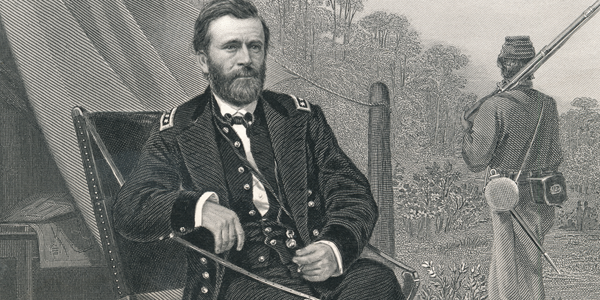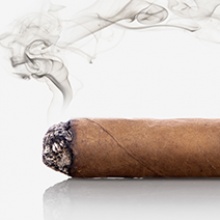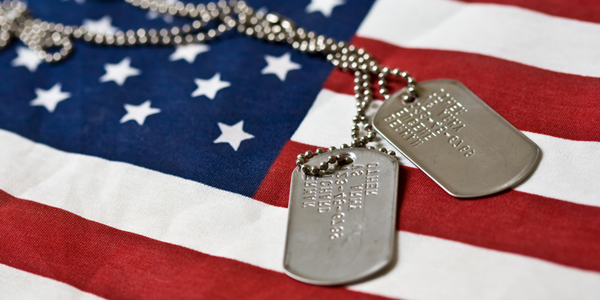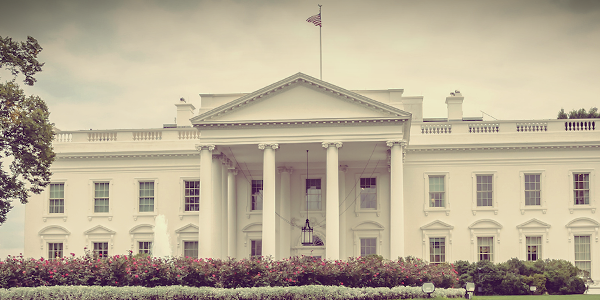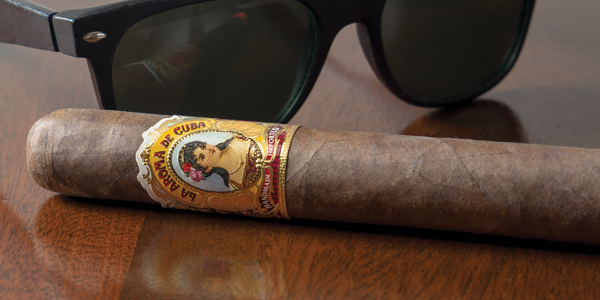History of Cigars & The Military
For a long time, the US military banned smoking among the troops. As the website of the National Museum of the United States Army reports, “Smoking in the services came under attack in the 1980s. Anti-smoking campaigns were ordered and by 1994 the Pentagon banned smoking in the workplace. By 2002, the Department of Defense (DOD) had fully implemented a 1997 executive order banning smoking in all government-owned, rented, and leased interior spaces. Today, soldiers continue to smoke, chew, and dip while Congress and DOD are considering a potential ban on sales of tobacco products on military bases and ships.”
That included cigars, but it’s a fuzzy area. In fact, on the ground of this nation’s longest war, there’s a cigar lounge where soldiers and others bond over stogies. We’ll get to that in a moment.
Cigars have always held a notable presence among some of the world’s more famous military leaders. Now, before you ask to include Fidel Castro and Che Guevara, this look is focused on members of the militaries of national governments and not rebels, even though those two later became powerful members of a revolutionary national government. Here are some notable military cigar aficionados.
Ulysses S. Grant
Ulysses S. Grant was the 18th president of the United States. As a Union general in the nation’s Civil War, it is widely reported, he smoked up to 20 cigars a day, smoking more and more as the conflict progressed. He had been written about smoking a cigar during battle. That resulted in people sending him “the choicest brands.” Grant had more than he could smoke himself and gave away many cigars.
When he became president, Grant would leave the White House at the end of the work day and take the short walk to the Willard Hotel, relaxing in the lobby smoking one or two cigars. Since it was difficult for people who had business with the government to get an audience with the president at the Oval Office, they would wait in the hotel in hopes of getting a few words with Grant. Grant, it’s reported, called them “lobbyists.” Grant died in 1885 of throat cancer.
Many U.S. presidents who came before and after Grant also possessed an affinity for fine cigars.
Winston Churchill
We all know about Churchill’s smoking as prime minister of the United Kingdom, but that all began when he was a soldier before World War I. When Churchill was in the British army, peace had reigned for years and, like many ambitious officers who wanted to distinguish themselves in battle, there were none nearby to join. Churchill himself wrote of those times in his book, My Early Life: A Roving Commission. Chapter 6 was titled “Cuba.”
“Rarity in a desirable commodity is usually the cause of enhanced value, and there has never been a time when war service was held in so much esteem by the military authorities or more ardently sought by officers of every rank."
Understanding that distinguishing one’s self in combat was a path to recognition and fame, Churchill sought out a real war. He hoped it would be "a private rehearsal,” he wrote, “a secluded trip, in order to make sure that the ordeal was not unsuited to my temperament."
Churchill found the Spanish-American War raging in Cuba as the island sought independence from Spain. There, Churchill wrote, “real things were going on. Here was a scene of vital action. Here was a place where anything might happen. Here was a place where something would certainly happen. Here I might leave my bones."
Churchill and a fellow officer went to Cuba in November of 1895. The Spanish military commander they were to have met never showed up, so the two Brits ended up in one of Havana’s best hotels, their “combat” experience limited to consuming oranges and Cuban cigars. That’s when Churchill began his love affair with Cuban cigars.
George S. Patton
General Patton was a legendary master of modern warfare who commanded the U.S. Seventh Army in the Mediterranean theater of World War II and, after D-Day, the Third Army in France and Germany. Patton was famous for his temper and did not suffer fools easily. And he was rarely without a Cuban cigar, or a pipe, in his mouth. Legend has it that he had his soldiers carry around a large humidor full of cigars during military assignments.
As one story, too-good-to-verify, put it, Patton once ordered his troops to decapitate a water buffalo that had “looked at him kinda funny.” Patton looked on and never stopped puffing on his cigar.
Tommy Franks
General Tommy Franks, a 37-year Army veteran, last served as Commander of the United States Central Command and oversaw operations in 25 countries. Franks was in charge of leading the fight against the Taliban in Afghanistan after the September 11, 2001 terror attacks; and also the 2003 invasion of Iraq along with the ousting of Saddam Hussein. And he loves to smoke cigars, keeping them in his more than 20 humidors in his home.
As Franks told Cigar Aficionado in a 2003 interview, his love of cigars began early on.
“I probably became interested in cigars when I was in about the fourth grade or fifth grade and I first saw my uncle, Bob Meyers, out in Midland, Texas, when we were living out there in the middle of the oil patch. I was beginning to grow up and my uncle smoked King Edward cigars. And he and I used to go to along with my dad to baseball games. There was a minor-league ball club in Midland, Texas at that time. And we used to go to ball games and I remember my uncle sitting there in a baseball box smoking King Edward cigars. And then I noticed that many of the people with whom he associated—oilmen, bankers and that lot—smoked cigars. And I always thought that's kind of classy behavior.”
Franks also remembered a special moment when he lit up something a bit more premium than a King Edward in one of Saddam’s palaces.
“It was wonderful. It was not a celebration. You know, celebrations occur at the end of things and no one believes—none of the military guys—none of us believed that we had hit an end state in Iraq. But on a very important occasion, which was the gathering of all of the Central Command commanders in Baghdad, we all smoked a cigar, sitting around in one of the regime palaces, and it was a wonderful occasion. Sort of the kind of occasion one can frequently mark by smoking a good cigar.”
Richard Overton
Richard Overton, a veteran of World War II, passed away in 2018 at the age of 112. Overton served with the all-black 1887th Engineer Aviation Battalion, seeing action in the South Pacific. He fought at the battle of Iwo Jima. Overton left the Army with the rank of sergeant. Overton began smoking cigars in 1924, at the age of 18, and got up to as many as a dozen a day.
"I smoke 12 a day," Overton told Cigar Aficionado in 2015, when he was 109 years old. “But I don't inhale them. It's the good taste. Let your lungs stay clean."
The Tali-Banned Cigar Aficionado Club
Despite the military’s official efforts to curtail smoking, soldiers these days are fond of relaxing when they can with a good cigar. In 2009, the Tali-banned Cigar Aficionado Club was founded in Kabul, Afghanistan, taking its name from the Taliban’s ban on smoking.
As the military newspaper, Stars & Stripes, reported, the club is not just about smoking a cigar. “It’s a bond of friendship, an escape from the drudgery of deployed life and a taste of home.”
Army Chief Warrant Officer Carl Tenbrink arrived in Kabul in 2016 and joined the club soon after he received some cigars in a care package from his father.
“He’s an old-school Army guy,” Tenbrink said of his dad. “He was in Korea years ago. That was the thing then, so he sent me [some].”
Tenbrink joined the club at the suggestion of Captain Cory Weiss. Weiss first began enjoying cigars while he was a cadet at the Citadel, where the tradition was that first-year cadets had to buy cigars for upperclassmen. The cigars would be smoked at Thanksgiving.
Army Major Cassie Daly was recently president of the cigar club in Kabul. She started smoking cigars during a 2003 deployment in Iraq. While Daly says smoking remains “only a deployment crave,” she has been instrumental in starting cigar clubs at two other bases to which she’d been assigned. Daly says many of the club members are women.
“This is our getaway place,” said Col. Thomas Mitalski, a Marine Corps Osprey pilot in charge of the counter-improvised explosive device mission in Afghanistan. “We can blow off some steam. That’s really why I’m attracted to the cigar club.”
Many of the cigars smoked at the club come in packages from friends and family, but there’s a simple way you too can donate.
Donate Cigars to the Troops
You can send cigars directly from Holt’s to any APO or FPO addresses around the globe. Enjoy the same fast, fresh convenience and customer service we provide to everyone right here at home. If you are an active member of the military, veteran and/or retiree, National Guardsman or Armed Forces reservist you can enjoy a daily a 10% discount courtesy of Holt’s. The discount also applies to all active and non-active First Responders.
Another easy way to give a gift of premium cigars and accessories to military personnel stationed across the globe is to do so by supporting a reputable charitable organization. One of the best known is Cigars for Warriors, a nonprofit that relies primarily on donations from cigar companies for inventory to forward to troops abroad.
Ammodor, manufactures custom ammunition box humidors, and is an active participant in various military gift giving organizations and service providers, such as Humidors for Heroes.
Another great non-profit to consider is Operation Deployed: Only Our Best; For Our Best, – a group that does its best to get the goods to our folks stationed abroad and is accessible via social media.
No matter which organization you choose to work with, your donation will bring some of the small comforts of home to the troops. For instructions on how to donate as an individual, check out our Guide to Sending Cigars to Soldiers & Troops.

